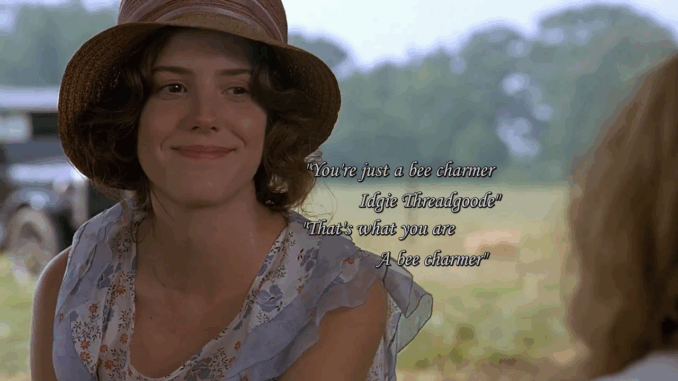
A Life Defined by Silence and Survival
Ruth Jamison’s journey in Fried Green Tomatoes begins in the shadows—trapped in a loveless, abusive marriage to Frank Bennett, she embodies the silent suffering of many Southern women in the early 20th century. Soft-spoken and devout, Ruth seems at first to be a supporting figure. But as her story unfolds, it becomes clear that her quiet presence holds immense strength.
Her courage isn’t loud like Idgie’s. It’s subtle, almost invisible, but no less powerful. Ruth’s decision to leave Frank isn’t just an act of survival; it’s a radical choice for autonomy in a time when women had few legal protections or societal support. Escaping with the help of Idgie, Ruth begins to reclaim her life, one gentle, firm step at a time.
Rebirth at the Whistle Stop Café
In Whistle Stop, Alabama, Ruth begins again—not as a wife or victim, but as a businesswoman, mother, and nurturer. She and Idgie create the Whistle Stop Café, which quickly becomes a safe haven for locals of all colors and classes. Through food, conversation, and kindness, Ruth helps create a space where people feel seen and valued.
What’s remarkable about Ruth is her emotional intelligence. While Idgie acts on instinct, Ruth listens and considers. She’s the calming force, the moral compass. Her maternal love extends not just to her son, Buddy Jr., but to Smokey Lonesome, Sipsey, and even Evelyn—through the stories passed down via Ninny. She is the heart of the café, holding it together through illness, poverty, and tragedy.
The Love That Dare Not Speak Its Name

Though the film (and book) stops short of explicitly naming the relationship between Idgie and Ruth as romantic, their bond speaks volumes. Their affection, co-parenting, and mutual devotion suggest a deep romantic connection. Ruth, raised in traditional values, never labels their relationship—but her actions, like returning to Idgie and building a life together, transcend convention.
For many viewers, particularly in the LGBTQ+ community, Ruth and Idgie’s relationship is seen as a pioneering example of queer love in mainstream cinema. Ruth’s quiet bravery in living that truth—without validation, safety, or societal support—makes her a symbol of enduring, unspoken love.
The Tragic Beauty of Her Final Days
Ruth’s final chapter is heartbreaking. Diagnosed with cancer, she faces death with the same grace that marked her life. She doesn’t rage or retreat. Instead, she uses her remaining time to love more deeply, to solidify the community she helped create, and to ensure that Buddy Jr. and Idgie will be okay.
Her death isn’t just the loss of a character—it’s the breaking of a delicate, nurturing balance. Idgie is never quite the same afterward. Neither is Whistle Stop. Yet Ruth’s legacy doesn’t die. It lives in every story told, every dish served, every person protected at that café.
Ruth in Today’s Lens – A Feminist Hero Redefined
Today, Ruth Jamison would likely be celebrated as a survivor, a feminist, and a queer icon. Her bravery wasn’t loud, but it was groundbreaking. She rejected a life of pain, chose freedom, and created love where there was once only fear. She mothered a child not born of safety but of sacrifice. She loved a woman not because society allowed it—but because her heart did.
In the modern reimagining of Ruth’s character, one might see her as a therapist, an advocate for domestic abuse survivors, or the owner of a nonprofit café that employs women in need. Her story, even decades after the film’s release, resonates in a world still battling the same injustices she quietly fought.
